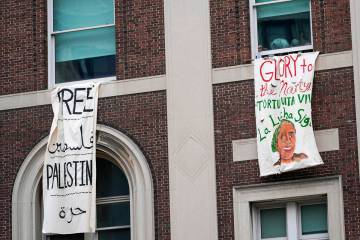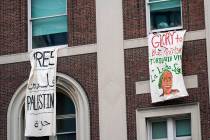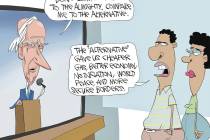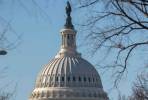COMMENTARY: School discipline reform didn’t create Florida shooter — and can help kids who need it
A March 26 Review-Journal editorial wrongly blamed school discipline reform for the shooting in Florida. By better understanding both the record in Florida and the purpose and nature of school discipline reform, we can take meaningful steps to improve school climate and educational outcomes for Nevada’s students.
Although the editorial argued that teachers and administrators ignored Nikolas Cruz’s behavior, Cruz was, in fact, the subject of repeated, firm disciplinary punishments that were anything but “lax.” Starting in middle school, he received multiple suspensions, was sent to an alternative school for emotionally disturbed youth and ultimately was expelled from his high school.
Further, there is no indication that Cruz participated in any alternative disciplinary program, such as Broward County’s nationally recognized PROMISE program, a joint initiative by schools, police and courts that attempts to address root causes of student misbehavior instead of immediately referring children to the juvenile justice system. Cruz therefore did not somehow escape punishment or receive protection under a “relaxed” disciplinary regime.
Contrary to the editorial’s assertions, Cruz’s family, friends and neighbors made local police and the FBI well aware of his problems and homicidal threats — though, sadly, this did not result in action.
In addition, mental health resources, both within the school district and from the state, were insufficient. The Broward County School District is critically low in employing key comprehensive mental health personnel such as school counselors and psychologists (only one counselor for 462 students and one school psychologist for 1,983 students). The Clark County School District’s current budget hopes to provide one school counselor for 500 students and one school psychologist for 1,825 students. In reality, however, there are far fewer professionals per student. These ratios are nowhere near the recommendations of the American School Counselor Association (one school counselor for every 250 students) and the National Association of School Psychologists (one psychologist for every 500-700 students).
If there is one “concerning” parallel between the Broward County and Clark County school districts that should serve as “a wake-up call,” it is this one.
It is fundamentally misguided to characterize school discipline reform as going easy on violent students. Instead, school discipline reforms target a particular problem: over-reliance on suspension and expulsion for nonviolent behavior. The vast majority (95 percent) of suspensions are issued for minor infractions such as disrupting class, violating dress code and tardiness. The consequences of such automatic, exclusionary discipline on students are severe and largely counterproductive.
The American Psychological Association’s extensive report on zero-tolerance discipline finds that exclusionary punishments not only deprive students of classroom learning time and are associated with higher dropout rates and lower graduation rates, but they also fail to deter student misconduct, make schools less safe and cost schools and taxpayers more.
Lawmakers — such as those in Florida — and school districts across the United States have therefore sought to limit exclusionary discipline only to circumstances where school safety is threatened by violent or criminal behavior. Banishing students who talk back, dress inappropriately or are perceived as disruptive — relying on suspension, expulsion or transfer to tough “reform” schools — yields more student alienation, disaffection and antisocial behaviors. Alienated students are more likely to strike back violently at teachers, administrators and other students.
Many schools are developing innovative alternatives, including those grounded in “restorative justice” principles. The editorial wrongly casts “restorative justice” as a failure to respond to misconduct. When utilized appropriately, restorative practices teach students prosocial skills and keep them engaged in learning while also holding them directly accountable for their actions. School discipline reform has the potential to strengthen students’ connection to school, improve climate and safety and does not excuse violent offenders such as Cruz.
The editorial further misconstrues the problem of racial disparity in school discipline. It is true that black, Latino and Native American students, from pre-K through 12th grade, are disciplined at rates disproportionate to their representation in the school population. Years of data substantiate this phenomenon. But this disproportionality does not mean school teachers and administrators are deliberately, consciously racist.
Research reveals a far more complex story involving, for example, overtaxed educators with little institutional support, poor school climate measures and under-resourced programs, all of which affect adults’ disciplinary decisions in different ways. Efforts to acknowledge, understand and address racial disparities in school discipline must be taken seriously.
When properly understood, school disciplinary reforms can assure and reinforce school safety and should not be sacrificed by those hoping to distract attention from the conversation about guns. Last month, Gov. Brian Sandoval announced a new School Safety Task Force to examine current laws and recommend reforms. This task force should bring together Nevada experts with diverse experiences and perspectives. They should draw on extensive and reputable research into the educational, financial, psychological and emotional costs of exclusionary discipline, as well as viable alternatives.
Nevada needs smart policy that is grounded in reality, not in the politics of fear — our students and our educators deserve it.
Lydia Nussbaum is an associate professor at the UNLV Boyd School of Law and associate director of the Saltman Center for Conflict Resolution.




























